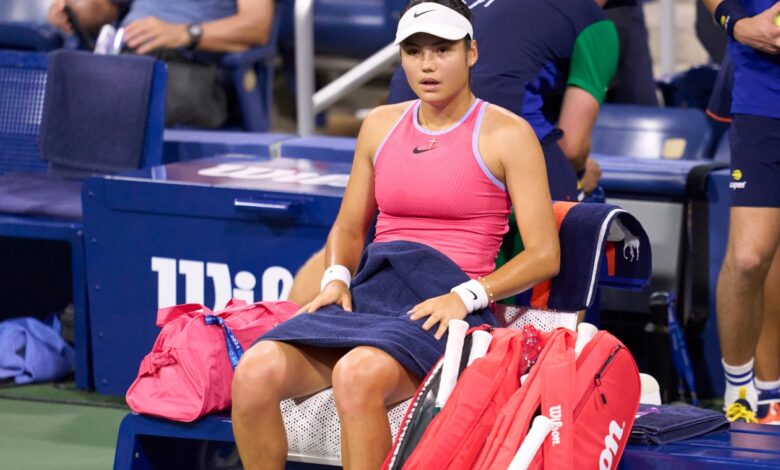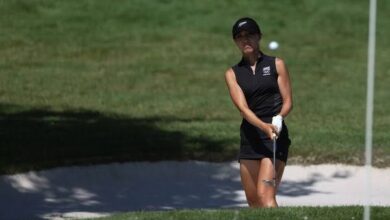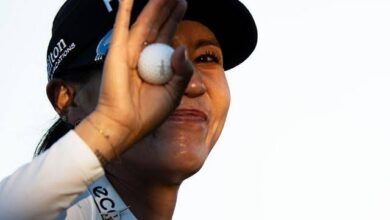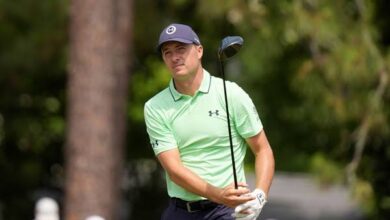Emma Raducanu breaks down in tears and rues costly error as she crashes out of US Open

Emma Raducanu broke down in tears after a chastening first-round loss at the US Open, admitting that “this is a tournament I really want to do well in”. Three years after rewriting the record books on Arthur Ashe Stadium, Raducanu has yet to add another win at Flushing Meadows to the 10 she accumulated on the way to the 2021 title here. Her latest setback came on Tuesday night at the hands of Sofia Kenin, another member of the “one-slam wonder” club who has never quite built on her own unexpected success at the 2020 Australian Open.
Now ranked at No54 in the world, Kenin arrived in New York on a demoralizing run of six defeats from her last seven matches. But this high-profile assignment on the Grandstand Court seemed to reinvigorate her. She bamboozled Raducanu with drop shots, outgunned her with aces, and delivered the greater weight of shot in the baseline exchanges. The 6-1, 3-6, 6-4 defeat left Raducanu admitting to her sadness at this latest reverse, as she wiped away tears in her post-match press conference. This was by far the most emotional she has been after a defeat.
But for all her disappointment, Raducanu didn’t try to cut the interview short. And neither did she shy away from her shortcomings, acknowledging that she had mismanaged her schedule on the way into the US Open. “I would have preferred to probably play a little bit more,” said Raducanu, who took a three-and-a-half week break from the match court after her quarter-final loss to Paula Badosa in Washington on August 4. “When I have a lot of matches, just like every player, you feel really good. You feel like everything’s automatic. So yeah, I think I can learn from it and manage my schedule slightly differently.”
Asked if it was entirely her decision to go home after Washington, rather than stay for the two Masters events in Toronto and Cincinnati, Raducanu replied: “I would say it wasn’t me. It was more of a collective call and, yeah, that’s what happened. You can’t really change it.”
One suspects that the call might have been influenced by the need to play qualifying at both events, because of Raducanu’s modest ranking in the 70s. Did she, or someone in her management, feel that a defeat in qualifying might be bad for the brand? We don’t know for sure. But rather than racking up the tournaments, Raducanu has spent most of the year working away behind closed doors at the National Tennis Centre in south-west London with her coach Nick Cavaday. It sometimes feels as if they are running experiments together in a tennis lab – and perhaps searching for a technical breakthrough that can take her back to the giddy heights we remember from 2021.
But the thing about working in a controlled environment is that you don’t have to deal with the unpredictability of a spiky opponent like Kenin – a player who is constantly changing the point of attack to keep you off balance.
On Tuesday night, Raducanu was comfortably outcompeted by the feisty Kenin, who struck the ball with far greater freedom and was prepared to gamble on the big points.
Having taken a pummelling in the opening set, Raducanu did at least show some nous and grit in the second. She slowed the pace of the game down, stalling the twitchy Kenin – who always seems to be on the point of a furious eruption – by constantly going to her towel between points.
Kenin started chuntering away to herself, and either slapping balls into the backboard or tossing them away in high dudgeon. Her forehand began to fly long with regularity, handing Raducanu some cheap games.
To her credit, though, Kenin never backed off. She knew that she was not going to beat Raducanu, one of the game’s silkiest movers, by trading conservatively from the baseline. She needed to exploit her power advantage, and she did that in a deciding set that saw her hit 18 clean winners, mainly fast and flat forehands.
We saw a telling moment in Kenin’s penultimate service game, when Raducanu found herself back-pedalling to hit a crucial overhead. It was an awkward ball, and she ended up in no-man’s land between a classic smash and her favoured drive volley.
Here was a good example of a non-scripted moment, in which Raducanu needed to improvise or manufacture something a little different to the norm. The sort of skills – in other words – that are more likely to develop through competition and matchplay, rather than a guided training session.
You won’t be surprised to hear that Raducanu flapped the ball long. And from the way she reacted, standing stock still for fully 10 seconds while she adjusted her visor and stared at her coaching team, she understood the significance of the miss.
Here was a big opportunity wasted – but hardly the only one, for Raducanu never seemed to find a way of controlling the flow of points. From the very beginning of the match, she was reacting rather than dictating, and she admitted afterwards that she had been surprised by Kenin’s aggression and accuracy.
“Credit to her,” said Raducanu. “There was no let–up, whereas in previous matches that we’ve watched her play, the level wasn’t constant from the start to the end. There were a lot more fluctuations, whereas today, I felt like she was pretty on it the whole time. She was better than me, and that’s it.”



